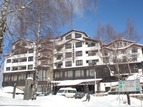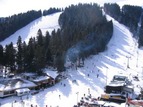Sustainable Tourism
Sofia Echo Com, 09.05.2005
History of Bulgarian Tourism The dramatic growth of tourism in the second half of the 20th Century is one of the most remarkable economic and social phenomena of our time. International tourist arrivals grew from a mere 25 million in 1950 to 700 million in 2003, according to the World Tourism Organization. That’s an average annual growth rate of 6.5 per cent. The receipts generated by these arrivals increased at 12 per cent a year over the same period, well above average annual economic growth rate, reaching $525 billion in 2003. Bulgaria has also experienced tourism growth in recent years and now has an opportunity to further develop tourism as a means of economic and social development. Before 1989, Bulgaria was an important tourism destination in Eastern Europe. The government invested heavily in tourism infrastructure, not only along the Black Sea and in the ski resorts, but with the creation of more than 30 000 km of marked hiking trails, a system of mountain huts and many large health spas. After 1989, Bulgaria lost its international tourists to the European destinations that most Eastern Bloc travelers could not reach before. Additionally, the post-1989 government did not have the knowledge, experience or finances to market Bulgaria in order to bring more tourists here. According to the National Statistics Institute, tourist visits are increasing, but still have not reached the peaks the country experienced in the 1980’s. From January to November 2004, approximately 4 million foreign tourists visited Bulgaria, more than a 14 per cent increase over the same period in 2003. Revenues from international tourism were reported as approximately 1.6 billion euro for the first 10 months of 2004, an increase of over 20 per cent over the same period the previous year. Unfortunately, statistics are not available by region, but based on conversations with people in tourism businesses around Bulgaria, the majority of tourists and tourism revenues are going to the large Black Sea and mountain ski resorts and large cities. Relatively few tourists visit smaller towns and rural areas. It is also clear that most tourism revenues generated in Bulgaria are not staying here, and only a small portion of what stays benefits the local community. Tourism and Development It’s no wonder the Bulgarian government has named tourism a priority. Tourism provides one of the best opportunities for sustainable economic development. It has several unique attributes that make it valuable to communities, even beyond its economic benefits. Tourism is one of the largest and fastest growing sectors of the global economy, accounting for approximately 10 per cent of the world’s gross national product, employment, and investment. Tourism is also very labor intensive. It creates more jobs than any other industry, provides entrepreneurial opportunities for microenterprise, small and medium-sized enterprises and non-governmental organizations. Tourism’s diversity expands both the formal and informal economy, bringing tourists to rural areas, for example, or teaching visitors local traditions or about local ecology. Unlike other industries, tourism brings the customer to the product rather than the other way around, so it provides more value-added linkages to other local sectors, such as agriculture, construction and handicrafts. Tourism also can develop in areas that lack development while complementing existing livelihoods and activities. Tourism also has economic spin-offs into other sectors, such as training and education, communication, construction and energy. It generally serves as an economic engine for infrastructure development, increasing standards of living and human, social and cultural development. Introducing tourism in areas rich in natural and cultural resources gives local communities a financial incentive to preserve what they have. Tourism also creates meaningful interactions between visitor and host, shattering stereotypes and bringing together a diversity of cultures, religions, and people. Sustainable Tourism To achieve these goals, however, tourism must be well-planned and managed. It must be socially, culturally, and environmentally responsible. It has to be designed to achieve maximum benefits to local communities and integrated within national policies and strategies for sustainable development. The world has seen far too many examples of the negative impacts of tourism. Unplanned tourism wastes resources or even destroys the environment. Foreign often companies benefit at the expense of local communities. Tourists sometimes offend locals with their behavior. In the Caribbean, it has been estimated that 80 per cent of all money spent by tourists leaks out of the local economy via foreign owned businesses and imports. Peru’s Machu Pichu, less than 100 years after its discovery, is already finding that it is far above its limit for sustainable usage. Spain’s Costa del Sol is perhaps the most famous example of the burden of over-development. There too much cheap construction drove tourists away, leaving locals with decaying infrastructure. Bulgaria is running these same risks with its tourism development. It is imperative for future tourism development to find an alternative that avoids these negative effects. Bulgaria needs sustainable, responsible tourism. Sustainable tourism attempts to make a low impact on the environment and local culture while conserving local ecosystems and generating income and employment. It is responsible tourism that is both ecologically and culturally sensitive. Sustainability implies permanence, so sustainable tourism includes optimum use of resources, including biological diversity. It seeks to minimize ecological, cultural and social impacts and to maximize the benefits of conservation for local communities. There are many examples of sustainable tourism. Globally it is becoming increasingly popular for tourists and tourism businesses alike to seek out sustainable alternatives in planning a trip. It is, however, important to realize no body is required to describe their business as “Eco-tourism” or “Cultural Tourism,” so these terms are often simply used as marketing buzzwords. Some of the important characteristics of sustainable tourism include hosting small groups of travelers, which minimizes their impact on their destinations, hiring local employees and buying local goods and services to focus financial benefits in the community and educating tourists on local customs and ecology to increase awareness of sustainability issues. Alternative Tourism in Bulgaria As anyone spending time in Bulgaria knows, this country has tremendous natural resources, an incredibly rich history and wonderful traditions, all great ingredients in a tourist destination. Bulgaria’s vast network of marked trails and mountain huts make it possible to hike from one end of Bulgaria to the other without ever leaving the mountains, or you can hike or bike from village to village without ever using a paved road. Also, unlike almost every other country around the world, so much of the natural heritage of Bulgaria is still untouched by civilization. One of the positive effects of communism here was a lack of industrialization. Environmental groups in Bulgaria are working primarily to prevent damage where, in many other countries, they are working to reverse damage already done. Other amazing natural treasures found in the Bulgarian countryside include a tremendous wealth of native plant species, because two of the major European migratory paths pass through Bulgaria, over 400 species of birds and 70 per cent of all European bird species. The country also features a fascinating diversity of natural landscapes: mountains and valleys, rivers and lakes, caves and rock formations, canyons and waterfalls. Entering a village in Bulgaria makes you feel like you’ve gone back in time to a Europe that no longer exists. The incredibly long history of this small country can be seen not only in museums, but throughout the countryside. Highlights of this history are not limited to the nine UNESCO World Heritage sites in Bulgaria – most notably the Madara Horseman, the Thracian Tomb at Kazanluk, the Rock Church at Ivanovo, and Rila Monastery. State of Alternative Tourism in Bulgaria Given all of these natural, cultural and historical wonders, Bulgaria appears to be an ideal destination for alternative tourism. However, the country is still dominated by mass tourism and is still relatively unknown worldwide as a tourism destination. Recently there has been some good news and some bad news for Bulgarian alternative tourism development. More people are interested in developing alternative tourism here and more tourists here are enjoying it. The government is speaking up in support of alternative tourism, but they have done relatively little to back up those words. Municipalities and entrepreneurs have shown more interest recently for alternative forms of tourism. Communities in all regions of Bulgaria have developed and submitted plans to find funding for cultural tourism and eco-tourism. Membership in the Bulgarian Association of Alternative Tourism (BAAT) has grown. New associations, formed specifically to promote rural, village, cultural and eco-tourism, have entered BAAT competitions. BAAT has also seen a tremendous increase in tour operators offering alternatives to mass tourism, from only a handful seven years ago when the association was founded to about 40 last year. The Bulgarian government has also been advocating sustainable tourism, though actions speak louder than words. At recent national and regional tourism fairs, the Ministry of Culture and Tourism and the State Agency for Tourism continue to give their verbal support to sustainable tourism initiatives. But the majority of promotional materials and events are still benefiting large resorts. Just last year the government adopted a National Eco-tourism Strategy. It’s a great step forward, but somehow there is still no National Tourism Strategy – a strange contrast, but unfortunately an example of the inconsistent nature of government interest. The Black Sea coast is already experiencing the effects of over-development. Despite yearly increases in tourists and new construction for the past few years, this year the seaside is expecting fewer visitors. Tourists are complaining about too much construction, overcrowding and lack of infrastructure to support the crowds. Now prices are falling, and owners are giving up. There are already a number of hotels for sale, but few buyers. The saddest part of this situation is that developers have not learned their lesson. They are now setting their sights on beach property further south where there are fewer hotels. Another recent complication for Bulgaria is the so-called ’Bansko Disease’. Municipalities across Bulgaria have seen the success of Bansko and want to become the next in line for large foreign investments and major development. Unfortunately, no one seems to be paying attention to the negatives. Massive erosion from development of the ski runs is destroying the local ecology and will eventually affect the town as well. A large portion of the money tourists spend leaves the community. Throngs of tourists and new construction are spoiling the original attraction of the beautiful old town. If the development of Bansko is not enough, we now have ’Super Borovets’. This project includes plans to build within Rila National Park, despite Bulgaria’s protected areas laws. Parliament recently considered changing the law to allow construction in protected areas. They didn’t make any changes, but somehow Super Borovets won approval anyway. As in other resorts, substantial interest for the development of the project has come from foreign investors. It seems like a bleak picture for Bulgaria, but creating a sustainable future is still a possibility. Achieving the full benefits of tourism requires a commitment to develop responsible tourism. This will require cooperation among national and regional governments, NGOs and other stakeholders, and increased communication between government ministries and industry. This commitment should in turn be followed by an effective national strategy for tourism that ensures an integrated, coordinated, phased approach to sustainable tourism development within a framework of the nation’s development goals. It will certainly be a challenge to achieve, but it is possible. Bulgarian businesses are gaining an interest in alternative tourism, and this country has so much to offer to tourists beyond the beach and ski resorts. · Rich Fromer, an MBA Enterprise Corps volunteer business consultant, is working with the Bulgarian Association for Alternative Tourism. see source
 Member of:
Member of:



























 Touroperator
Touroperator
